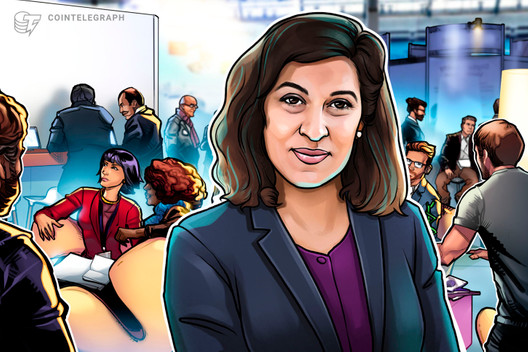Diversity and Inclusion in Blockchain and Crypto: The Gender Aspect
Diversity and inclusion are valued higher in the crypto space than in traditional finances, but there are some cultural obstacles we need to overcome.
When we talk about financial inclusion, we have to think about inclusion for whom, in what context, and what inclusion itself means. One of the common answers when thinking about who needs to be “financially included” is “most currently unbanked people, who should ideally have access to commercial banking systems.”
But it’s not as simple as just asking, “How do we get unbanked people into the banking system?” because the banking system can be exploitative, and newly banked customers often wind up being the least-important customers or paying the highest fees, among other issues. There are significant limitations on the extent to which current systems are the right solution for a lot of people’s actual needs.
So, we have to ask tough questions and understand what the critically important problems actually are, particularly as we proceed upward on the hierarchy of needs. I think we need to examine access to crypto in this context.
Gender cultural code as the reason
A question I think about a lot is: Whom do we as a society empower to take risks? Generally speaking, the answer is young-ish white men from certain (privileged) educational backgrounds — noting that whether or not they actually completed college is usually not considered relevant. These individuals have access to not only certain kinds of privilege, but they also have the ability (engendered by cultural and social habits and norms) to accommodate an enhanced level of risk. Obviously, it’s not the case that “every white man can take on risk,” but the disproportion is clear: Young white men are founding more companies more often, and a reason for that is that they are culturally oriented toward thinking that it’s okay to fail, and it’s okay to take risks. They have a confidence that is culturally ingrained in them.
When looking across non-white cultures, risk-takers are still predominantly male. We as a society empower men to take risks that we do not similarly empower women to take. There are a million reasons for this that are coded in gender, and it is something we have to acknowledge before we can effectively address it.
The good news is that in the United States, the way we’re raising girls now is very different from the way I was raised. I examine and pay a lot of attention to this as a parent, as I have three young daughters. My daughters are definitely getting very different messaging from the media, from books and from their teachers than I received. Even though I was raised in a progressive household when it comes to gender issues, these external cultural influences are very powerful, and it’s wonderful to see how much progress has been made. I am not going to say that the job is anywhere near done, because gender roles are still very coded into our culture and language, but there is cause for optimism.
Mathematicians and the coder identity
Another thing I’ve been thinking about a lot is STEM education — specifically, why girls leave math and computer science in droves. I’ve been reading up a lot recently on the fascinating idea of decolonizing mathematics. There’s a whole social justice movement about developing an identity as a mathematician or a computer scientist. Culturally in the U.S., or even more broadly speaking in Western cultures, there is no notion of an identity of a female person as a mathematician. It is familiarity with these kinds of concepts and mathematical fluency beyond arithmetics that eventually leads to familiarity with coding, which then paves the way to being interested in careers in coding and logic.
Part of it is really starting to ask questions like, What is the cultural identity as a coder and how is that culturally ingrained? We still suffer from this idea that it’s some loner who puts on headphones and drills in. That isn’t necessarily wrong; introverts often do tend to gravitate towards coding, and there’s no question that some of these things are personality traits (though I’m an extroverted woman who loved coding, for the record). But personality traits do not have to be gender-coded unless we make them so, at a societal level. We can choose what cultural context we create around mathematics and coding.
I love that my daughters now have access to books with protagonists who are girls of color who are scientists. Series like that didn’t exist when I was growing up, where the protagonist is basically a girl of color, deliberately positioned against the supposed black-and-white of who is and isn’t a scientist to eventually solve mysteries using science. Representation matters, at every level. If you see something, it becomes easier to imagine.
Now, to get an education about crypto, whether as an investment vehicle in terms of money or from a tech perspective — you pretty much have to have minimum connectivity, or internet access. The access needs to be robust and stable enough to provide hours and hours of time to become an expert in the field. Moreover, there needs to be a family structure that enables a member to dedicate their time and can cover expensive network costs to facilitate the endeavor. Ideally, there should be access to an institution with people who can teach you, whether through online activities like streaming or downloading, or through a community, or by having access to experts, or whatever it might be. You have to have a lot of support around such an undertaking.
In a three-part documentary called Inside Bill’s Brain, Bill Gates demolishes the premise of Malcolm Gladwell’s nonfiction book Outliers. Microsoft’s founder said he used to just go down to his parents’ garage with friends and tinker around with robotics as a kid because he had access to it. Therefore, a lot of onboarding in tech is about what gets put in your path. The learning curve and its hurdles in tech are a lot higher for someone who does not come from an environment where these technological options are presented to them.
The opportunities presented to each person determine the likelihood of their understanding something like crypto. It’s difficult to imagine the success of some people in the crypto and blockchain space, myself included, if they hadn’t, to some extent, serendipitously fallen into a certain kind of environment. Nowadays, the needed environment to learn about tech, specifically crypto and blockchain, is more common, but it’s still far more prevalent in some places than others.
There is a woman named Fareshteh Forough, an Afghan social activist, who is the CEO and founder of Code to Inspire, a coding school for girls in Afghanistan. It’s a great example of an inspiring woman who wanted to develop a community for coding and robotics for girls. The school’s programs aren’t taught as traditional education, but as a trade that women and girls can do from their own homes, without even having to go out in public. They make money for their families using their skills, thereby making their education and work status culturally acceptable. Forough basically decided not to try to fight patriarchal culture. She accepted elements of it and said, “Nevertheless, within this patriarchy, I can still create opportunities for women and girls to engage in these kinds of activities. I can train them and they can actually create a livelihood.”
Forough is also looking at where the money goes. To prevent women’s wages from being taken by their male relatives, she is empowering some of them via crypto so they can create their own accounts and have their own wallets. In this way, they can create a separate, private, account for themselves, as their relatives rarely understand how crypto works and aren’t able to track it down. This access can lead to more opportunities and empowerment.
When you examine context, you can’t just assume that everything is equal. Part of what the progressive race relations movement in the U.S. has been so good at doing is saying, “Look, there are real differences here.” It is not the same thing to be raised black in an urban center and white in a suburb, to take one often-cited example. Economic privilege, obviously, is critical to access as well, in addition to ability, gender, etc. Imagine you’re dealing with a lot of other things, like unequal education and/or the fact that you have to regularly combat discrimination for not fitting into a traditional gender role or for not being neurotypical; these affect how you move through the world.
I don’t think that I’m saying anything particularly radical, but I do think that these things are not talked about enough in the blockchain space or are talked about quietly, in quiet corners or on the women’s or LGBTQ+ panels at a conference, rather than much more openly like other issues. So, what I sometimes do is focus on financial inclusion as a proxy, because so much activity is happening around that conversation right now, and I can push people to at least acknowledge that there is an issue and be willing to speak about it.
I work for the World Economic Forum, so my official professional view is one of objectivity. And I think that, objectively, we have a huge problem with inclusion in our society! Again, I don’t think saying that is novel or radical, because it is, or should be, obvious and self-evident. Once you accept and internalize this reality, you can get to a place where you start kicking out ideas and thinking, How do I address that? But it can’t be addressed without understanding the context.
Cryptocurrency and financial inclusion
Crypto is fascinating for a zillion reasons, one being that it came about because there was a really interesting problem and someone wanted to solve that problem. I don’t think that Satoshi Nakomoto, who invented Bitcoin, was thinking about inclusion in any meaningful way – I think it was much more about government surveillance issues and financial stability — that kind of stuff. I think it was a nerdy, libertarian sort of approach. Back in 2009, we were at a time of increasing dissatisfaction with the government’s approach to a lot of different things, and I think crypto has become a critical response to that. But I think it’s pretty safe to say it wasn’t originally about helping poor or unbanked people.
Now, we’re at a point of maturity with this technology: an inflection point to build something that can actually address these social issues and be a tool to help democratize systems. We, as a community and as an ecosystem, need to make a choice about which side we are going to come down on regarding equality in conjunction with how we use these new forms of technology and for which purposes we implement them. We need to think about user rights, and decentralization, what its pros and cons are, and the other benefits of all these opportunities.
Each of us as individuals has a set of choices to make. To start changing the world, you don’t have to wait for the right protocol or the right app or company. To solve these problems, individuals have to make a decision on their own about what matters to them — rights, equality, inclusion and other issues — which leads them to think about this stuff every single day and embed these ideas into emerging tech by asking themselves: Why is decentralization exciting? Why is it important? What is it about the system that isn’t working? What are the systems that we are building as alternatives?
How do we ensure that we’re really considering the points of view of unspoken-for individuals specifically and not guessing or building or colonizing yet another environment, like we did with mathematics? Because that’s the default. It’s the easiest thing to do, and it’s what will happen if we don’t pay attention.
This article is from an interview held by Max Yakubowski with Sheila Warren. It has been condensed and edited.
The views, thoughts and opinions expressed here are the author’s alone and do not necessarily reflect or represent the views and opinions of Cointelegraph.
Sheila Warren is the head of blockchain and distributed ledger technology for the World Economic Forum. Previously, Warren was the vice president of Strategic Alliances and general counsel to TechSoup, a nonprofit network of NGOs providing technological solutions to other NGOs. Warren was also responsible for the formation of NGOsource, a blockchain-backed initiative focused on international grantmaking.




